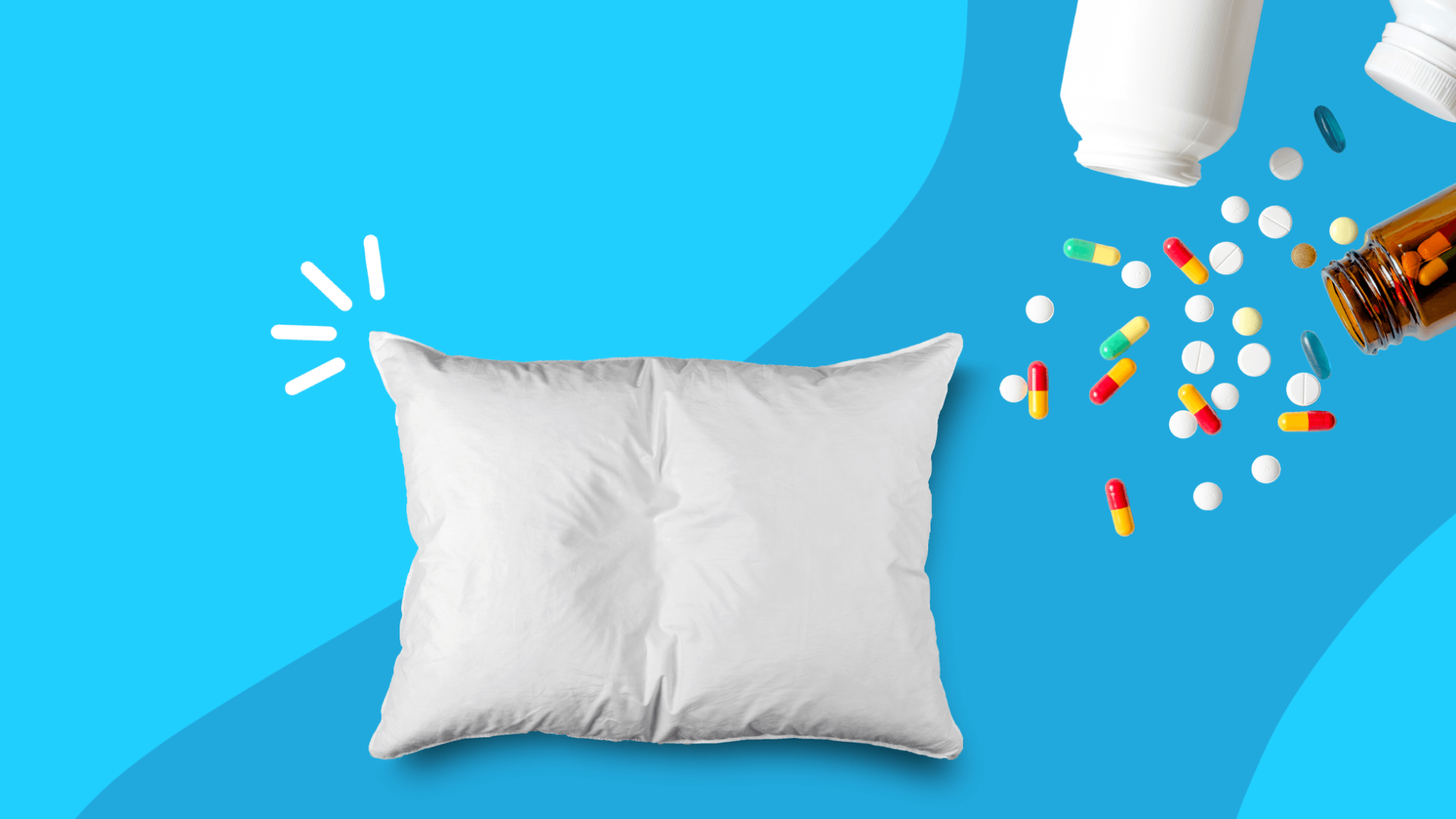Insomnia is one of the most common sleep disorders in adults over the age of 65. According to the Journal of Clinical Sleep Medicine, up to 50% of older adults may experience trouble falling asleep or staying asleep throughout the night. Older adults may be particularly vulnerable to problems with sleep due to stress or other causes. Left untreated, insomnia may lead to different health problems, including an increased risk of depression, high blood pressure, heart disease, and diabetes.
If you or someone you’re caring for is experiencing insomnia, a healthcare provider may recommend various treatment options. Sleep aids for older adults are widely accessible and include over-the-counter and prescription medications. However, because of their potential side effects, these medication options should be used with caution. Continue reading to learn about medication and non-medication options to help treat insomnia in the elderly.
What causes sleep problems in the elderly?
Sleep problems, like insomnia, can affect all aspects of life, including mental, emotional, and physical health. But what causes insomnia in the elderly? The answer may be more complex than just a single factor.
As people age, they may experience natural changes to their sleep patterns. These changes may include a decrease in deep sleep, waking up more often throughout the night, and having trouble falling asleep. In addition, certain medical conditions may become more common with age, such as sleep apnea, restless leg syndrome, and chronic pain, all of which can disrupt sleep. Older adults are more likely to take prescription medications, such as beta-blockers, decongestants, and corticosteroids, which may also interfere with sleep.
Certain lifestyle habits can affect sleep and make it hard to have a consistent sleep schedule. These lifestyle factors may include:
- Poor sleep hygiene: Doing stimulating activities before bedtime or consuming excessive caffeine may make it harder for older adults to fall asleep or stay asleep.
- Lack of physical activity: Being sedentary during the day may cause trouble sleeping, as regular exercise has been shown to improve sleep quality in older adults.
- Social isolation: Older adults who experience loneliness or a lack of social support may be more likely to develop insomnia.
Problems with sleep can worsen existing health issues, negatively affect mental health, and reduce overall quality of life. One of the first steps to finding the best sleep aid or treatment may involve finding the root causes and potential risk factors of insomnia.
Older adult treatment options for sleep
There are several treatment options that can potentially improve sleep in older adults, which you can recommend to your patients. These include over-the-counter (OTC) medications, prescription drugs, and lifestyle changes.
Over-the-counter medications
OTC sleep aids are accessible without a prescription and are often perceived as safer and less habit-forming than prescription sleep medications. Common OTC sleep aids include:
- Antihistamines: Commonly found in allergy and cold medications, antihistamines such as Benadryl (diphenhydramine) and Unisom (doxylamine succinate) may cause drowsiness and help improve sleep.
- Melatonin: As a natural sleep aid, melatonin can help regulate the sleep-wake cycle, especially for people who’ve experienced changes in their circadian rhythm. It may be recommended by healthcare providers for insomnia or jet lag disorders.
- Valerian root: This herbal remedy has mild sedative properties, which may aid in reducing the time it takes to fall asleep. Research has shown that it may be a safe and effective natural sleep aid.
Although OTC medications don’t require a prescription, they may have side effects and interactions with other medications. It’s recommended to consult a healthcare professional before using any OTC sleep aids.
Prescription drugs
For older people with persistent sleep issues, prescription drugs may be another option. As a pharmacist, you might see patients commonly prescribed the following medications:
- Benzodiazepines: Medications like Restoril (temazepam) and Ativan (lorazepam) may help individuals fall asleep faster and stay asleep longer. However, these medications can be habit-forming and may lead to increased risks of falls and cognitive impairment in older adults.
- Non-benzodiazepine sedative-hypnotics: These medications, such as Ambien (zolpidem) and Lunesta (eszopiclone), work similarly to benzodiazepines but are less likely to be habit-forming.
- Antidepressants: Low doses of certain antidepressants like Desyrel (trazodone) and Remeron (mirtazapine) may be used to treat insomnia in the elderly.
Older adults using prescription sleep aids may need to be closely monitored by their healthcare provider due to the risk of side effects and interactions with other medications they may be taking. Be sure to carefully go over side effects and interactions with your patients when they are prescribed these medications.
Sleep hygiene practices
One of the best natural sleep aids for older adults is having a regular sleep routine. You can advise your patients on creating a comfortable sleep environment and following healthy bedtime habits. Consider giving the following tips:
- Keep a consistent sleep schedule by going to bed and waking up at the same time every day, even on weekends.
- Ensure the bedroom is dark, quiet, and cool, as these conditions may help improve sleep quality.
- Limit exposure to screens and electronic devices before bedtime, as they emit blue light that can interfere with the body’s natural sleep-wake cycle.
- Avoid caffeine and alcohol close to bedtime, as they can disrupt sleep patterns.
- Create a relaxing bedtime routine, such as reading a book or taking a warm bath, to signal to the body that it is time for sleep.
Physical exercise and relaxation techniques
Regular physical activity may help improve sleep quality in older adults who are able to exercise. For example, moderate aerobic activities, such as walking or swimming, may help improve sleep duration and reduce the time it takes to fall asleep. Older adults should aim to schedule exercises during the day, preferably in the morning or afternoon, as exercising too close to bedtime may interrupt sleep.
Relaxation techniques, such as deep breathing exercises, progressive muscle relaxation, and mindfulness meditation, can also help promote better sleep. These practices can reduce stress and anxiety, which are common factors that can cause sleep problems in older adults.
Potential risks of sleep aids for elderly people
Sleep aids, both prescription and OTC, may pose various risks for older adults. As people age, their bodies may process medications differently, increasing the chance of potential side effects. Older adults often have multiple chronic conditions, which may also complicate the use of sleep aids.
The American Geriatrics Society (AGS) publishes the “BEERS Criteria,” which lists potentially harmful medications for older patients. This list includes several sleep aids that may lead to serious side effects, including falls, cognitive problems, and even death. Therefore, it’s best to consult a healthcare professional before using any sleep aids, as they can recommend safer alternatives or adjust dosages to minimize risks.
Common general side effects of sleep aids include:
- Dizziness
- Dry mouth
- Fatigue
- Headache
- Nausea
Non-medication options are often a first-line treatment for insomnia in older adults due to the potential side effects of medications. However, if medications are needed for cases of insomnia, it’s important to watch for side effects and only use medications under the supervision of a healthcare provider.
What is the best sleeping pill for the elderly?
When it comes to finding the best sleeping pill for the elderly, there is no one-size-fits-all solution. The effectiveness and safety of a sleeping pill will depend on the person’s specific needs, existing medical conditions, and any potential interactions with other medications they might be taking.
| Medication name | Availability | SingleCare coupons |
| Ambien (zolpidem) | Prescription | Ambien coupons |
| Lunesta (eszopiclone) | Prescription | Lunesta coupons |
| Desyrel (trazodone) | Prescription | Trazodone coupons |
| Unisom (doxylamine) | OTC | Unisom coupons |
| Melatonin | OTC | Melatonin coupons |
Consult a healthcare professional before choosing a medication. A healthcare provider can determine the proper dosage and monitor the person’s response to the medication to reduce potential risks.
Takeaway
For many older adults who struggle with sleep disorders, treatment could mean the difference between a good night’s sleep and other health problems. Treatment options include natural sleep aids, prescription drugs, and sleep hygiene practices. However, a healthcare provider may recommend lifestyle changes first because of the potential side effects, such as sedation, an increased risk of falls, and cognitive problems. If insomnia persists, medication may be the next best option.











